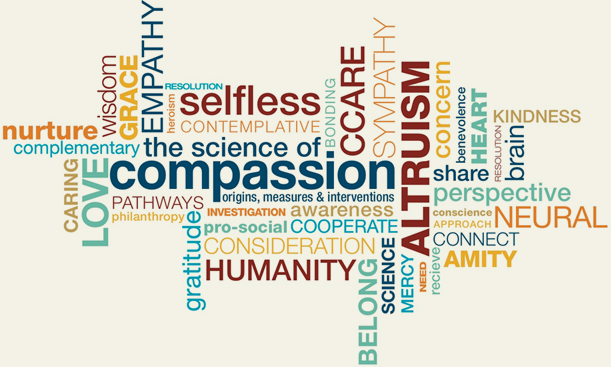What Is Compassion? Is Compassion The Same As Sympathy?
Human nature is inherently good and possesses a moral compass, but as time passes, this goodness is often buried due to selfishness and the ups and downs of life. However, this moral compass does not disappear entirely; it remains within us and it is up to us whether we choose to overcome obstacles and rediscover it, allowing it to warm our souls once again.
What is compassion?
Compassion is generally associated with terms such as “empathy,” “forgiveness,” “benevolence,” or possibly “sympathy,” et cetera, as they all share a similar concept. Empathy is a branch of the vast ocean of compassion, faint shadow of the Buddha’s heart that exists within the human soul. Compassion is, in fact, goodness, and it serves as a mirror to ensure that one never falls into indifference.
The concept of compassion refers to the ability to empathise and understand the emotions that others are experiencing in their souls. Sympathy, on the other hand, can be destructive to the soul of the person it is directed towards. Compassion towards others involves accurately identifying their emotional state and taking action to not harm them, regardless of the situation. Someone who causes harm through sympathy demonstrates their own weakness and inadequacy; their pain is determined from afar and this feeling is accompanied by a destructive energy, which shows that the person is unable to overcome difficult situations and acknowledge their own sacrifice.
Compassion is considered a special quality, always ready to help without hesitation, showing love for those around us, feeling and accepting their pain. A compassionate person is always attentive and sensitive to those around them, respecting their preferences and experiences. To show benevolence means to empathise, to want to rescue another from an unresolvable fate. The object of compassion is those living beings who are suffering, and the aspect of it is the desire to relieve their suffering.

Source of Image: the Internet – While sympathy and compassion may share some similarities, it is crucial to recognise their distinct differences. Compassion is the stirring that urges people towards goodness and helps those who are unfortunate.
What is the similarity between sympathy and compassion?
The similarity between sympathy and compassion is that both express concern for others. Although they are different emotions, they do share a commonality. Sympathy and empathy both indicate the presence of sadness. They are characterised by sadness, and these emotions demonstrate the value of human beings; they are both essential and humanity depends on them.
While everyone can see the similarities, not everyone can recognise the distinct differences, but they cannot be denied.
What are the major differences between sympathy and compassion?
Firstly, sympathy in reality has the power of compassion, which may be a fleeting emotion, but in the second emotion, empathy does not possess any overpowering strength, rather it is a more sustainable feeling that can lead to action.
A person who is rich in compassion is always ready to be there, even when there is nothing to do to help. Even their mere presence is a sign that the situation, no matter how difficult it may seem, can be accepted. When there is a reliable shoulder to lean on, there is surely a way out. It is healing even in seemingly hopeless situations. This demonstrates that love has a healing effect on the soul.
Sympathy is merely a certain feeling of empathy with the pain or misfortune of others, often with an element of pity. Sympathy is also a feeling of helplessness, clinging, and haze. Empathy is characterised by action and intelligence. It always seeks a balance between acceptance, letting go, and action. For example, many directions of Buddhism prescribe the development of certain qualities within each individual. This religion starts from the fact that there are many things that are inherent in each person. You can become a victim of circumstances, or you can face them successfully. The key is making the right choice.
Sympathy does not contain empathy, but empathy is present, encouraging others to overcome their suffering. The fundamental difference between these emotions is that one is destructive and the other is constructive.
Sympathy is entirely regretful, while empathy helps you cope with inevitable circumstances. Another important difference is the element of pity, which always follows sympathy but is not present in empathy. In empathy, others are seen as equals, not inferior.
Sympathy is characterised by isolation, while empathy is characterised by integrity. Those who feel sorry for themselves, without receiving anything good from it, continue to be victims. No one benefits from this attitude. Poverty and misery are a path to nothingness.
Sympathising with someone may further immerse them in darkness and suffering. This behaviour sends a message of inferiority. Those who are pitied and accustomed to weakness may become inactive for a long time. Coping with adverse situations often requires decisive action. However, why take this course of action if it is easy to succumb to poverty and misfortune?
Individuals who pity themselves often share their burden with others in a cheerful manner – this is an effective way to shift responsibility for their actions and deeds, requesting understanding and care.
The prominent feature of compassion lies in its origin from the depths of the soul. This feeling can make others shudder and yet gentle, always maintaining composure. Compassion is not merely an emotional experience or self-care – it is the awareness of another’s spiritual pain, accepting them as they are. Through compassion, you can soothe suffering, take on their pain.
Empathy means standing in the position of someone who is suffering, while sympathy is recognising that someone is going through difficulty, yet feeling relieved that it is not happening to you.
Compassion is inherent in action, driving the search for ways to alleviate suffering – not just to comfort and pretend that “everything is okay” when it is not, but to find a way out of the current situation. A compassionate person does not separate themselves from the world around them, they feel absolute equality with everything. Compassion is a higher feeling, it stimulates a retreat from suffering, and pity only increases it.

Source of Image: the Internet – Without compassion, people fall into indifference.
Take a self-compassion test
Is there a measure or test for compassion? In reality, compassion cannot be measured or tested as it exists differently in each person. However, one should not blame their circumstances or environment and give up on compassion.
A person without compassion is equivalent to being “indifferent.” “Indifferent” is a familiar term, but upon closer examination, it is too heavy to evaluate a person. Indifference implies a lifestyle of apathy, indifference, and insensitivity to emotions. When we mention this phrase, we also feel an invisible pain, a selfish and lonely life.
Compassion is truly powerful, it evokes in you a sense of empathy, causing you to travel thousands of miles to bring warm blankets to children in the highlands, bathe and care for an elderly person living alone. It is only for people, but compassion is also for all things and events in life. It can be standing up to protect a faithful pet, taking the time to care for an abandoned flower, or simply giving a hug to those who are stuck in a difficult situation, and so on.
Don’t think of compassion as something too great. Sometimes it is just simple acts, such as picking up a nail or a sharp piece of glass and putting it in the right place, and that is probably enough. Now you probably know what compassion is!
Why do humans need compassion?
As quoted by the Dalai Lama, “if you want happiness, practice compassion. If you want happiness for yourself, practice compassion.” Indeed, helping others is helping oneself, and compassion means giving without expecting anything in return, resulting in inner peace and happiness.
Compassion does not bring wealth or material possessions, but it silently helps individuals reap things more valuable than material wealth. What does compassion give you?
Compassion cultivates a kind-hearted nature in individuals by promoting a treasure trove of intellectual and emotional attributes
Compassion is a necessary characteristic for leaders. It not only helps them achieve success in their work, but also allows them to excel in their positions. Additionally, compassion inspires and spreads to those around them, creating a supportive work environment where everyone can thrive.
When individuals have compassion, they naturally become more empathetic and forgiving towards their colleagues and subordinates. Compassion is not limited to thoughts, but also serves as a motivation for individuals to share and understand the emotions of others, ultimately leading to actions that create a more comfortable and beautiful life. Once someone has compassion within them, their character becomes more humble, they become better listeners, and they become more courageous.

Source of Image: the Internet – Compassion does not have to be grand gestures, and at times it can be as simple as a hug.
How to cultivate compassion in your life
Although compassion exists somewhere within our soul, we also need to learn how to bring it to the right place and at the right time. Do not let your compassion become a tool for others to exploit or use it in a way that is insincere, as this may result in being perceived as “fake”. Therefore, having compassion at hand but using it appropriately is still a difficult task for many.
So, how to cultivate compassion? You can refer to the following ways to cultivate your own empathy and compassion.
- Listen carefully to others’ problems without judgment.
- Encourage others to develop.
- Share in the joy of others’ successes.
- Forgive mistakes, because no one can be 100% perfect and not make mistakes.
- Show respect for others.
- Express gratitude to others.
- Offer to help someone with a task.
- Sincerely apologise when you make a mistake.
- Love yourself, and when expressing empathy to others, don’t forget to express this to yourself as well.
- And many more.
Do not think of compassion as pity or sympathy
In reality, many people use the word “pity” to describe empathy and help from others. However, this word itself is not bad, whether it’s pity, sadness or regret, it carries the same message as compassion.
Compassion brings a sense of empathy, creating harmony in the soul and helping the recipient reduce their pain and sorrow. Do not think that someone giving you a hug when you feel stuck is pity in a negative sense, but think of it as compassion, and you also need to open your heart with compassion to receive that gift.

Source of Image: the Internet – Do not think of compassion as pity in a negative sense.
Ultimately, it is difficult to define exactly what compassion is, even though the above assumptions are all vague, we all understand that compassion is not bad, it connects people together, prevents harm and makes life better, right? Therefore, do not let your compassion be buried, but sow it every day and find peace in your life!
People should strive to cultivate compassion and avoid pity. The first focuses on strength and freedom, while the latter is an expression of weakness that creates dependence.
Modified by VINH PHAN, Practice Leader of Executive Search & Board Services, and edited by CAM NHUNG, Senior Associate – Brand, Business Support & Customer Engagement; Referred to a Vietnamese composition by Đạt Võ | TTVH 22/01/2019
Don’t forget to follow and subscribe NB Asia’s social media pages across multiple platforms (Facebook, Instagram, and LinkedIn) to update on good knowledge and beautiful life information, and let’s work together to bring a better life to everyone!








